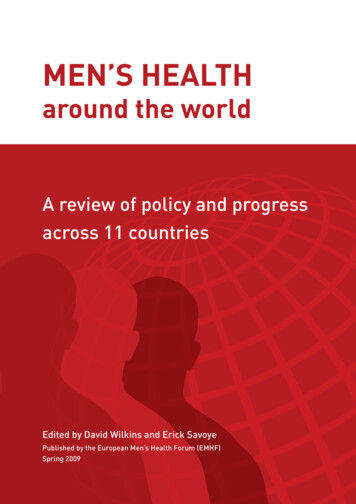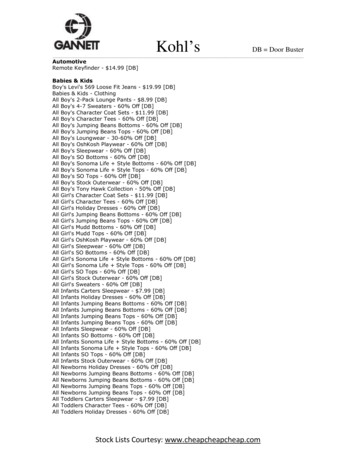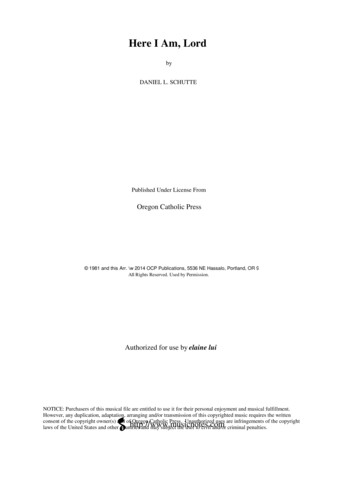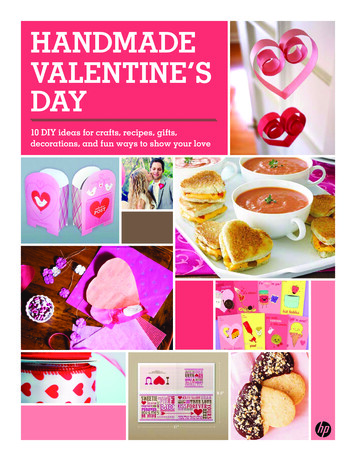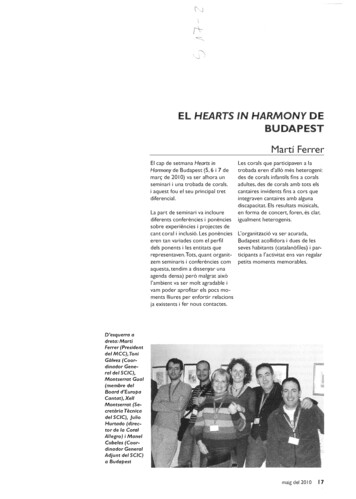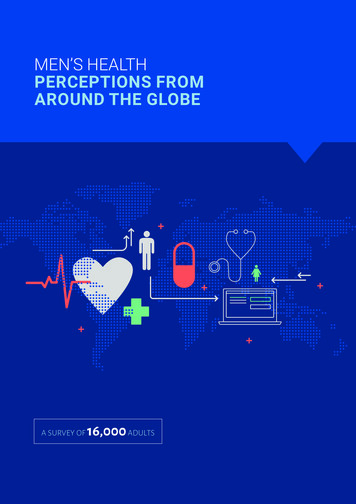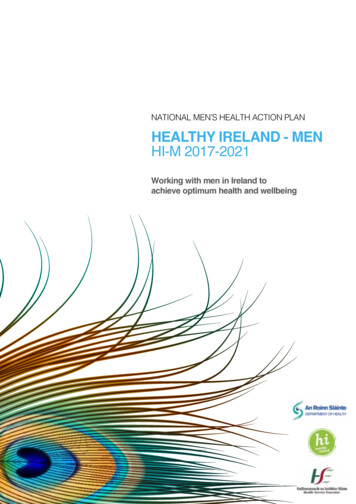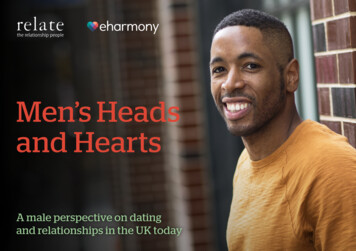
Transcription
Men’s Headsand HeartsA male perspective on datingand relationships in the UK today
ContentsForewords3Aidan Jones, Relate CEO3Romain Bertrand, UK Managing Director, eharmony4Methodology5Dating – what men are looking for in a partner6Men feeling insecure when dating7Impact of the #MeToo movement8Confusion around dating etiquette9The role of patriarchy in dating10Men in relationships – do set gender roles still exist?11Is communicating critical?12Being open about mental health13What are the barriers to accessing help?15eharmony’s tips for men who are dating16Relate’s tips for men in relationships17Accessing support18Men’s Heads and Hearts: A male perspective on dating and relationships in the UK today2
ForewordWe know from our previous research3that men often feel able to talk moreopenly where there’s a certain degree ofanonymity. When the pandemic hit weadapted how we operate – quickly movingall of our relationship support servicesonline.Aidan JonesRelate CEOAs we emerge from what has beenan extraordinary 18 months, we wantedto explore specifically how men arefeeling about dating and relationships.From previous research1 and from ourown experiences supporting couples andindividuals with their relationships andwellbeing, we know that men often findit harder than women to ask for and seekhelp.We also know that gender stereotypes stillexist within our society and we wantedto investigate whether this continues toaffect views when it comes to dating andalso within roles in relationships.Our findings are varied and interesting.60% of single men surveyed have feltinsecure when dating with the fear ofrejection being a main contributing factor.And our poll found that almost one in fourmen think that the #MeToo movement hashad an impact on their approach to dating.One in five men state that they feelcomfortable showing their vulnerability ina romantic relationship. It feels that a stepchange here is needed especially as one inseven men report to be currently sufferingfrom poor mental health2 but only onein ten men surveyed would considercounselling as an option.Our phone counselling, WebChat andMessage a Counsellor services aretherefore options which men may wishto give particular consideration to.Webcam counselling also has the benefitof being convenient and anecdotallyour counsellors tell us clients have beenquicker to open up about their feelingswhen in the comfort of their own home.If you’re affected by any of the issuesraised in this report, please see the finalpage for a list of services and resourcesavailable. We’d like to thank eharmonyfor making this research possible.1 ication-see-it-my-way-2013.pdf"From previous research and from our own experiences supportingcouples and individuals with their relationships and wellbeing, weknow that men often find it harder than women to ask for and seek help."Men’s Heads and Hearts: A male perspective on dating and relationships in the UK today2 This finding combines respondents who said ‘verypoor’ and ‘poor’.3 ication-see-it-my-way-2013.pdf3
ForewordRomain BertrandUK Managing Director, eharmonyThe COVID-19 pandemic haschanged the very fabric of our society andthe way we interact with family, friendsand potential love interests. The datingscene has seen a monumental shift – inparticular – with video and virtual datingmitigating feelings of disconnect.And though our methods ofcommunication may have changed, thecomplexities of dating remain. Our report,examining the way in which men date, hasshone a spotlight on some endemic issuesthey face, notably feeling insecure when itcomes to finding love.It would be implausible to say withabsolute certainty where theseinsecurities are rooted, due to thedynamism of every individual, but ourresearch gives us valuable insight.Interestingly, the research we’veuncovered with Relate suggests menand women share many of the samecommonalties when it comes to theirromantic insecurities. Men confess theystruggle with a fear of rejection andworries about their appearance, whichechoes what our female users have beentelling us for years.But where the genders potentially divergeis around their attitudes to moderndating etiquette. For instance, accordingto our report, many men have felt theimpact of the #MeToo movement, withthe onus inevitably on them to anticipateappropriate romantic conduct, includingmore subtle behavioural cues such as whoshould initially pay the bill. Whereas, forwomen, this is hopefully a relatively moreempowering era.Men’s Heads and Hearts: A male perspective on dating and relationships in the UK todayThere are indications that discussingtheir mental health is becoming lessstigmatised for men, with around a fifthsaying they could talk openly to theirpartner about such issues.This openness in communication iscore to both those in relationships, andthose searching for love. Real love isn’tneat or tidy, there are problems andchallenges to face. Which is why highlycompatible couples fare better, becausethey usually share the right conflictresolution skills.Above all, as experts in dating, weknow that clear communication helpsintimacy flourish, and eharmony’sunique Compatibility Matching System isdesigned with this in mind. Connectingsingles who will feel confident enoughto open up to one another about theirinsecurities is fertile territory for asecure and loving partnership.We’d like to thank Relate for theirinvaluable access to working practicecounsellors who made this researchall the more authentic.4
MethodologyRelate and eharmony conducted a focus groupwith four practising Relate counsellors tounderstand the challenges men face when dating.They also spoke to a small selection of men andsome quotes are included in the report.Censuswide conducted supplementary UK research inSeptember 2021, among a nationally representative sample of2,009 UK consumers. This was then boosted to include 1,031single respondents, and 201 respondents in Northern Irelandfor a total of 2,531 respondents surveyed.This report focuses predominantly on exploring men’s attitudesto dating, relationships and their mental health and wellbeing.The report does not cover the needs of specific groups ofmen nor does it look at differences in responses from men ofdifferent ethnicities nor those from differing income brackets(although men from all communities took part in the research).We briefly cover responses from males from the LGBTQ community4 where the poll size was large enough to share aspecific response for this group. For the purposes of this reportthe term ‘men’ and ‘male’ are used for all individuals who haveself-identified as such.Men’s Heads and Hearts: A male perspective on dating and relationships in the UK todayWhy is this report focusing predominantly on menand those identifying as male?We know from previous research undertaken byRelate and the Men’s Health Forum that men are lesslikely to seek help, both with health and wellbeingproblems and with their relationships.5We want to explore how men are really feeling in2021. We want to unpack the realities of dating asa modern man and ask men in relationships what’simportant to them. Also we want to understand howmen are feeling about their mental health and theiropenness to seeking support such as counselling aswe emerge from what has been a challenging timefor us all. By shining a light on how men are actuallyfeeling, we hope to challenge some of the genderstereotypes still prevalent in today’s society and atthe same time continue to raise the importance ofseeking help and support.4 This includes men self-identifying as gay, bisexual, asexual or other.5 ication-see-it-myway-2013.pdf5
Dating – what men are looking for in a partnerWith gender stereotypes often shaping expectations as to what menand women are looking for in a partner, we wanted to explore thereality of what men are actually seeking when it comes to dating.Our research shows one in four single,male respondents are looking forcompanionship from their romanticlife, with one in five looking to find reallove. Just over one in ten of this samegroup (11%) said that they were lookingfor no strings sex and over one in fivewere looking for someone to share theirhobbies and interests with (22%). Thisresponse was supported by what Relate isseeing in its counselling sessions:“Men are traditionally thought of asseeking sex, not relationships. I think thisis changing and I’m seeing more menlooking for relationships but some aren’tsure how to go about making it happen.”– Peter Saddington, Relate CounsellorWhen asked what qualities are consideredto be the most important in a romanticpartner, the top three responsesfrom men were honesty (47%), beingtrustworthy (47%) and having a goodsense of humour (42%).“The pandemic massively decreased socialcontact and so at the moment it feels likewe are making up for lost time. It’s greatto be able to go on dates again and meetlike-minded individuals.”– Single male22%of men were looking forsomeone to share theirhobbies and interests withMen’s Heads and Hearts: A male perspective on dating and relationships in the UK today6
Men feeling insecure when datingWomen are often thought of as feeling insecure when it comes todating and our poll confirmed this with 78% of the single women wequestioned agreeing that they had felt insecure when dating newpeople. What is perhaps more surprising is that 60% of single mensurveyed have also felt insecure when dating new people.6When we looked into this further we foundthat a fear of being rejected (27%) was themain contributing factor, closely followedby their age (24%) and their overallappearance (24%).“As counsellors we often see that men havethe same concerns and insecurities arounddating as women do but sometimes theyfind it harder to admit. Whilst almost twothirds of men surveyed admit to feelinginsecure, I wonder if this number is actuallyeven higher but that some men are stillstruggling to be honest because of real orperceived expectations placed on them.”be on the rise. Mind’s recent Get it off yourchest report found that the number of menwho are worried about their appearancehas increased from 18% in 2009 to 23%in 2019, with worries being the greatestamongst 18-24 year old males at 39%.7Our research supports these concerns –12% of single men surveyed feel that theydon’t have the ‘Love Island’ aestheticwhich is popular right now and that this iscontributing to feelings of insecurity. This isfurther backed up by the finding mentionedearlier about overall appearance being atop reason for men’s dating insecurities.– Gurpreet Singh, Relate CounsellorThe perceived importance of appearancewhen it comes to dating certainly seems toRelate Counsellor Josh Smith is seeingindividuals with the same concerns aroundappearance in many counselling sessions:Men’s Heads and Hearts: A male perspective on dating and relationships in the UK today“Admissions to eating disorder clinics haverocketed during the pandemic. Whilewomen are more likely to suffer fromdisordered eating, we know that it isunderreported in the male population,who are less likely to seek help. Generalanxiety around appearance, and bodydysmorphia specifically, is influencedby the portrayal of ‘perfect’ bodies onprogrammes such as Love Island and onsocial media.”Further factors driving dating insecuritiesfor men include prior bad experiences(19%), plus the feeling that they’re ‘out ofpractice’ after coming out of a long-termrelationship (13%). When it comes to datingnew people in the LGBTQ community,feelings of insecurity are even moreprevalent with almost three quarters ofmen surveyed (74%) stating that they havefelt insecure about dating new people.6 This statistic combines ‘Yes – Sometimes’ & “Yes –Always’ answer options.7 chest a4 final.pdf7
Impact of the #MeToo movementThere’s no denying the positive and widespread impact of#MeToo – the social movement against sexual abuse and sexualharassment. 39% of men surveyed overall think that theirapproach to dating has been affected by #MeToo.This increases significantly for men aged25–34 with 66% of those surveyed feelingthe impact; this figure greatly reduces toonly 20% of men over the age of 55.For some men the movement has openedtheir eyes to feeling more informed aboutthe importance of consent (14%). Forothers it has made them consider howthey are perceived by women (13%). Andone in ten male respondents (10%) feelashamed about how they have previouslytreated women, with 8% saying it madethem recognise their past behaviour wasunacceptable.But there’s clearly some way to go – forexample research in 2021 by the All PartyParliamentary Group for UN Womenfound that more than four fifths (86%)of UK women aged 18–24 report havingbeen harassed in public spaces.8According to our survey almost a quarter(24%) of men said they’d not really heardof the #MeToo movement and morethan one in ten (11%) think #MeToo isexaggerated. In addition, one in ten (10%)said they are now more confused thanever around how to behave.“Sexual abuse and harassment is neveracceptable and the damage caused bythis is something we regularly see incounselling sessions. Whilst four in tenmen across all age groups report havingchanged their behaviour as a result of#MeToo, it is encouraging that the numberis higher amongst younger men surveyed.”– Josh Smith, Relate CounsellorMen’s Heads and Hearts: A male perspective on dating and relationships in the UK today8 2021/03/APPG-UN-Women-SexualHarassment-Report Updated.pdf8
Confusion around dating etiquetteThe pandemic has meant thatwe’ve needed to adapt how webehave in society and socialnorms that were once taken forgranted, such as how we maygreet someone for example,have become more confused.So it’s no surprise that this has alsocarried over into the dating world. Morethan one in ten (11%) men feel confusedby modern dating.Furthermore one in ten men (10%) feelscared that they are going to say or dosomething wrong when on a date and onein seven (13%) men think it’s harder forthem to date than it was 10 years ago.The feelings of insecurity and confusionaround dating expectations seemprevalent across both genders with ourpoll finding that almost one in five men(19%) think that they should pay the billon a date. Interestingly less than one inten women (9%) agree that men should bethe ones to pay. Just under 3 in 10 womensurveyed think that you should split thebill on a date (29%) compared to 17% ofmen. It seems that a degree of genderstereotyping is still at play here althoughMen’s Heads and Hearts: A male perspective on dating and relationships in the UK todayfascinatingly our findings show that moremen think that the onus falls on them topay whereas more women are challengingthis approach and think that splitting thebill is the way forwards.9
The role of patriarchy in datingWhilst there is more awareness of gender stereotyping inrecent years there’s no denying that preconceived viewsabout men and women still exist in many facets of our society.Relate counsellor Josh Smith thinks it cansometimes be traced back to seeing ourparents’ relationships:“I see many clients who are quite shockedby how ‘old-fashioned’ their relationshipshave become. They find themselvesrepeating the patterns set by theirparents, who in turn were influenced bytheir parents. So despite often ascribingto modern values around gender equalityand the division of labour, men inparticular often find themselves fallingback into the patriarchal behaviours thatthey observed as children. This createsunhappiness within intimate relationships,especially for women, becauseexpectations aren’t met by reality.”This is supported by our survey findingswith 14% of men recognising that some ofMen’s Heads and Hearts: A male perspective on dating and relationships in the UK todaytheir views on dating and relationships arenow outdated.When asked specifically about patriarchyin today’s society and if it’s still a problem,13% of men thought that it was comparedto 21% of women. Over one in ten men(11%) felt that they still need to be thestronger partner and a similar number(11%) thought that it was harder for menthan women to meet and date new peoplein 2021 with only one in twenty women (5%)agreeing with this.eharmony relationship expert Rachael Lloydthinks that often men are fighting againstthe stereotype of ‘being the strong partner’:“The way for men to navigate modernrelationships is to listen, be willing tomake changes and to communicate more.However men often have to deal with abias of feeling ‘I’m strong; I’m right’ andthis may be partly due to their perceptionof how a man should be. There’s oftena fear of emasculation and humiliationwhich comes with allowing yourself to bevulnerable and maybe even reassessingyour view of the world.”10
Men in relationships – doset gender roles still exist?Relate counsellors are seeing the impact of the pandemic onrelationships with more people being based at home eitherbecause of job losses or because they are still workingfrom home. This has often led to changes in roles andresponsibilities for couples, with some struggling to adjust.“For many men going to work is a refuge.An increase in domestic and childcareresponsibilities have been a source ofstress for many relationships over the past18 months.”– Josh Smith, Relate CounsellorFor some men, however, being able towork from home has positively improvedtheir work-life balance.“Having the ability to work from home hasmeant that I’ve engaged more with mypartner and been able to do the school runmore frequently, which I’ve really enjoyed.This has led to a stronger relationship withmy daughter and a feeling that I’m playinga more active role in day-to-day familylife.”– AndyOur survey found that over a third of men(38%) feel that household chores should bedivided equally between partners with thisrising to almost half of women surveyed(49%). In total 12% of men surveyedthought that women should look after thedomestic needs of the family whilst menshould work and provide for the family.Men’s Heads and Hearts: A male perspective on dating and relationships in the UK today11
Is communicating critical?There’s much research and advice out there about the importance ofcommunication in relationships and it’s a fundamental part of Relate’swork supporting couples, yet only 41% of male respondents think thatcommunication is key to a successful relationship compared to 56%of women. In the LGBTQ community just over a third of men polled(36%) think that communication is key to a successful relationship.Relate Counsellor Peter Saddington thinkssome of the problem stems from menstruggling to know how to open up:“I find that men often do want to talk totheir partners and discuss their problems,they just don’t know how to start theconversation and make it actually happen.”Our poll found that 20% of malerespondents feel comfortable showingtheir vulnerability in a romanticrelationship. Whilst this is encouragingand starts to dispel some of the mythsaround ‘real men not showing theirsensitive side’ it also shows that there ismore work to do on removing the stigmaof men being able to have open andhonest conversations and seek support.“Men want to open up and be able to behonest and vulnerable but often needencouragement or the right environmentto do this. It’s positive that more men arefeeling able to talk to their partners andaccessing counselling support can alsooffer a safe space.”– Simone Bose, Relate CounsellorOnly41%of men think thatcommunication is key toa successful relationshipcompared to 56% of womenMen’s Heads and Hearts: A male perspective on dating and relationships in the UK today12
Being open about mental healthOur poll found that 16% of men surveyed would describe their currentmental health as poor compared to 21% of women. This increases toone in four millennials (26% of all respondents aged 16–24). 9One in five men (20%) can talk openly totheir partner with 17% feeling able to talkopenly to friends and family about howthey’re feeling.And 18% of male respondents think thatthey are better talking about their mentalhealth than they used to be. Whilst thisshows that some men feel comfortableopening up, it also shows that more needsto be done to help the five in six men whoare still struggling to be able to discusstheir mental health and wellbeing.16%of men described theirmental health as poorMen’s Heads and Hearts: A male perspective on dating and relationships in the UK todayThe Samaritans’ report Men, Suicide andSociety found that the way men are taughtthrough childhood to ‘be manly’ does notemphasise social and emotional skills.10And the government’s recent stance onmaking the teaching of Relationships andSex Education (RSE) compulsory in schoolsin England highlights the importance for allchildren of starting the conversation abouthealthy relationships at an early age.“The now-mandatory focus onRelationships Education in primary schoolsand Relationships and Sex Education in allsecondary schools is warmly welcomed byRelate. Starting to educate children andyoung people from an early age createsthe building blocks of positive relationshipsand will work towards challenging genderstereotypes and providing a channelto open up conversations about sex,relationships and wellbeing.”– Aidan Jones, CEO of Relate9 This finding combines respondents who said ‘verypoor’ and ‘poor’.10 https://media.samaritans.org/documents/Samaritans MenSuicideSocietyResearchReport2012.pdf13
The role of the mediaIt feels that over the last few years therehas been a substantial and much-neededshift in the conversations about mentalhealth. High-profile individuals openingup about their own struggles alongsidethe media communicating that ‘it’s okaynot to be okay,’ has helped to begin tochange perceptions. This is also beingreflected in counselling sessions:“The media is now helping to reinforcethe message that you don’t always haveto be macho and it’s okay to value arelationship has helped men to cometo sessions and be more honest. That ifa relationship breaks down, there aregoing to be issues and things to workthrough and that’s normal.”– Peter Saddington, Relate CounsellorMen’s mental health in theLGBTQ communityMind’s recent research has found that gay,bisexual and trans (GBT) men are morelikely to report poor mental health withmore than two in five GBT men (46%)experiencing depression in the last year.11Whilst the reasons for this are complexand varied many people attribute it atleast partly to stigma and discriminationrelated to sexuality or gender identity.Our survey found that over one in five(22%) male respondents in the LGBTQ community 12 felt that their mental healthwas currently poor.1322%of GBT men felt their mentalhealth was curently poor11 chest a4 final.pdf12 This includes men self-identifying as gay, bisexual,asexual or other.13 This finding combines respondents who said ‘verypoor’ and ‘poor’.Men’s Heads and Hearts: A male perspective on dating and relationships in the UK today14
What are the barriers to accessing help?Recent research has foundthat men are three times morelikely to see a therapist whenworried than in 2009 14 whichcertainly feels like progress.However our poll found that only one inten men surveyed (10%) would considercounselling if they were experiencingrelationship issues and only 13% haveaccessed counselling in the past.In 2011, 44% of Relate’s clients weremen and we know that they are morelikely to exit earlier from the counsellingprocess.15 In 2020-21 the number ofmen accessing Relate’s services was thesame as ten years earlier (44%).16 Whilstit feels that the conversation aroundaccessing support is beginning to openup, there’s clearly still work to do inencouraging men to seek help.Relate’s Try to see it my way report foundthat men are more likely to seek supportif they can access it remotely.17 Feedbackhas shown that making the process asanonymous as possible also helps tobreak down some of the barriers in place.Relate offers a variety of counselling andsupport options. These include WebChat,the Message A Counsellor email serviceand phone counselling which all offer acertain degree of anonymity. Webcamcounselling is also hugely popular.Men’s Heads and Hearts: A male perspective on dating and relationships in the UK todayYou can access any of Relate’s servicesindividually or as a couple.14 chest a4 final.pdf15 ication-see-it-my-way-2013.pdf16 Percentage of total Relate clients broken down bygender with appointments between 1 September2020 and 31 August 202117 ication-see-it-my-way-2013.pdf15
eharmony relationship expertRachael Lloyd’s tips for men who are datingBe honest about what you’relooking for (short-term versuslong-term relationship). Thiswill help you find someone whoaligns with your core values.Make a video date your newfirst date. This is a great wayof establishing that initialrapport and can fit intoanyone’s schedule.Manage your expectations:dates are opportunities to getto know different singles, oneof whom eventually might bea good match. Don’t expectinstant results.Avoid ‘dating burnout’ byensuring that you don’t matchtoo many people at once.Prioritise quality over quantity.Avoid bare-chested pics onyour dating profile. eharmonydata suggests this leads toconsiderably lower engagementfrom female matches.Post pictures which depict youenjoying leisurely activities.Research shows that this helpsincrease singles’ match ranges.Allow yourself tobe vulnerable andcommunicate. Most potentialpartners love a sensitive,enlightened modern male.Own your dating mistakes.Keep going for the same typeof compelling but high dramapartners? Time to stop. Stilldwelling on your ex? It’s timeto move on.Give chemistry time to grow.Not everyone feels it on thefirst date, and choosing tomeet only the most photogenicmatches means you mightmiss out on ‘the one’.Men’s Heads and Hearts: A male perspective on dating and relationships in the UK today16
Relate’s tips for men in relationshipsCommunication is key. Think(and talk) about what you wantfrom your relationship. You cando this with help from Relate ifit’s hard to do by yourself.Consider your views aroundroles in your relationship.Are your views in line with yourpartner’s? If not, how can youbetter align these to make sureyou’re both on the same page?Help to break down some of thestigma around mental healthand ask your male friends howthey are. And commit to listeningto them if they want to talk.Commit to seeking help if youneed it whether that’s with apartner or on your own.Be honest with yourself aboutwhat you want and be preparedto give time and energy to yourrelationship if things needworking on.Make time for each other.Lockdown has been hard formany couples. Spending qualitytime together as a couple can bea great way of reminding yourselfwhy you chose to be together inthe first place.Think about trying a new hobbyor interest together. It’s fun tolearn something new and will giveyou something to talk about.Men’s Heads and Hearts: A male perspective on dating and relationships in the UK today17
Accessing supportAbout RelateAbout eharmonyWe could all use some extra support sometimes. Relatehas a range of services including individual counselling,relationship counselling for couples, mediation and sextherapy. Currently these are provided online, usually viawebcam. Counselling is also available over the phone.eharmony launched in 2000, and now forms part of theParshipMeet Group the international market leader inmatchmaking. Real love remains at the heart of everything wedo. In an increasingly fast-paced dating culture, we take a morebespoke and supportive approach to creating relationships.Our unique Compatibility Matching System brings together likeminded singles who share core values and personality traits,which are key indicators of relationship success.In addition WebChat offers 30 minute sessions with atrained counsellor and Message a Counsellor is an emailservice where you get a bespoke reply to a specific issue.To find out more visit: relate.org.ukWe are constantly evolving our matching system, designed bypsychologists, which measures each member’s profile across 32dimensions of compatibility – factoring in traits such as kindness,openness, and communication style. The results speak forthemselves – every 14 minutes someone finds love on eharmony.Take our virtual tour at eharmony.co.uk
Women are often thought of as feeling insecure when it comes to dating and our poll confirmed this with 78% of the single women we questioned agreeing that they had felt insecure when dating new people. What is perhaps more surprising is that 60% of single men surveyed have also felt insecure when dating new people.6 be on the rise.
